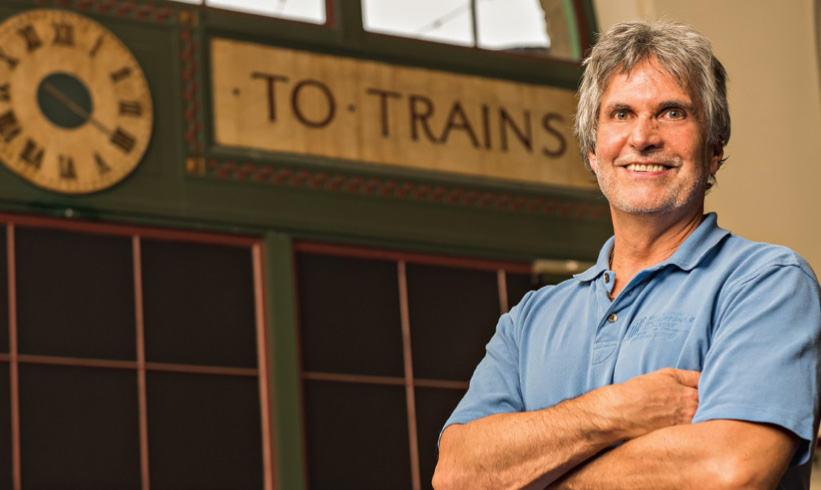

Today we’d like to introduce you to Jim Berlin.
Jim, can you briefly walk us through your story – how you started and how you got to where you are today.
Well, I started out as a driver at a trucking company, was there for about ten years before getting fired, and then went on to be a freight terminal dock manager for another ten years. I got fired there too for bending the rules to help one of our best customers solve a problem. Shortly after that, in 1996, I was offered a one-year purchase order to help manage inbound transportation for that same customer (GE Transportation, a division of General Electric). It wasn’t a lot of money, but I tried it anyway. We must have done okay, because we were named a corporate best practice after the first six months, and then again, a year later. It’s kind of funny, but we’ve never really had a business plan except to grow, and I’ve never been big on corporate structure; but it’ worked for us. Today, as we celebrate our 20th anniversary, we have over $150 million in global sales, and over 400 employees serving thousands of customers all around the world.
Has it been a smooth road?
I really believe that failure is a better teacher than success. So no, it’s not been a smooth road the entire way. A number of years ago, we purchased a couple of cargo vessels in an effort to bring container shipping back to the Great Lakes region of the U.S. That didn’t really pan out, and after incurring some losses, we sold both vessels a few years later. But we learned from the experience. On the culture side of things, we try to create a very fun, work-hard-play-hard kind of culture here; and employees that enjoy the freedom and latitude we give them, really seem to like it here. When you let employees sort of self-manage themselves, you have to be careful that they don’t take advantage of that flexibility at the expense of others who are busting their balls to do good work. We have that occasionally, but it sorts of works itself out, because the good employees will generally call-out someone who’s not carrying his or her own weight. It’s a very wild-west, rough-and-ready culture. So I tell people “when you come to work, wear a cup,” because you’re going to get busted-up a little bit. But if you do the right job and you hire the right people for that – they love it! If you hire the wrong people, they hate it. If you want to come to a place where you’re told what you do, and every day someone is going to tell you “good-job, good-job,” and it’s the same thing day-in-day-out, then this place is not for you. But if you like to take on new challenges, try some new things, have some fun, and have a few laughs along the way – then this is the place for you. You find those people and they stay forever.
So let’s switch gears a bit and go into the Logistics Plus story. Tell us more about the business.
Stuff moves, and will continue to move, all around the world. What we do is move stuff. That’s logistics. Whether it moves by air, by ocean, on the highway or on a rail, we know how to move stuff really well. We’re also well known for moving really big stuff that other companies either can’t or won’t touch (often in or out of the Port of Houston). We find a way to do it because logistics is in our DNA. What sets us apart is that we put the “plus” in “logistics.” The plus is the extra things we do; because a lot of times in the world of logistics, things happen. I say “shit happens,” but things happen. You can’t control that. You can’t control a storm, or a red light, or dock hours, or port congestion. But you are still responsible for results. It’s very easy to tell a customer “sorry but … this isn’t going to delivery because …” That’s what everyone does. But a lot of times, not all times, but most times, there’s a way to find a “yes” or to find a solution to the problem. It takes a lot of extra work, extra hours and resourcefulness, but if you do that, you distinguish yourselves from everyone else.
How do you think the industry will change over the next decade?
It’s funny that with all the changes in technology, etc., that things are still pretty much the same as they’ve been for thousands of years, only faster and with more visibility. A lot of the issues are the same as when I’ve read about the expansion of global trade in the 16th century. We move stuff. And stuff will ALWAYS move. And there may/will be more apps and drones and robots doing a lot of the work but, if you look around your office or your home or the bar or restaurant you’re sitting in, EVERYTHING came from somewhere. Someone packed it and shipped it and moved it and delivered it, and I don’t ever see that changing. Drones are just a cooler way of doing it than the clipper ships were (well, maybe; clipper ships were pretty cool).
Contact Info:
- Address: Logistics Plus Inc.
12941 North Freeway, Suite #600,
Houston, TX 77060 - Website: www.logisticsplus.net
- Phone: 1.866.564.7587
- Email: quotes@logisticsplus.net
- Instagram: https://www.instagram.com/logisticsplusinc/
- Facebook: https://www.facebook.com/LogisticsPlus/
- Twitter: https://twitter.com/LogisticsPlus
- Other: https://www.linkedin.com/company-beta/104914/






Image Credit:
Logistics Plus®
Getting in touch: VoyageHouston is built on recommendations from the community; it’s how we uncover hidden gems, so if you know someone who deserves recognition please let us know here.

















